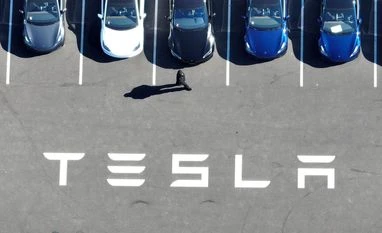Federal prosecutors have expanded investigations into Tesla beyond the electric vehicle maker's partially automated driving systems, and they have issued subpoenas for information instead of simply requesting it, the company disclosed Monday.
In a quarterly report filed with the Securities and Exchange Commission, Tesla said the Department of Justice is looking into personal benefits, related parties, vehicle range and personnel decisions without giving details.
The additional investigation topics and the subpoenas suggest that prosecutors have broadened their inquiry, and they have found the need to force Tesla to disclose information, legal experts say.
The filing indicates prosecutors may be investigating Tesla CEO Elon Musk, and whether the company has been candid in describing the features of its vehicles, they say.
In January, Tesla disclosed that the Justice Department had requested documents related to its Autopilot and Full Self-Driving features. Both features are classified as driver-assist systems, and the company says on its website that the vehicles cannot drive themselves.
Now, the company is disclosing a probe that is a lot wider than just looking at Autopilot and FSD features, said Erik Gordon, a University of Michigan business and law professor. The DOJ often starts with a formal written request and escalates to administrative subpoenas if it thinks it isn't getting full cooperation, he said.
More From This Section
Specifying additional items that prosecutors are looking at indicates that Tesla lawyers found them serious enough to change the company's public disclosures, Gordon said.
Tesla didn't respond to a request for comment, but the company based in Austin, Texas, said in its SEC filing that to its knowledge, no government agency has concluded that any wrongdoing happened in any ongoing investigation. The Justice Department declined to comment.
For the first time, Tesla said in its filing that the investigations could damage the company's brand. Should the government decide to pursue an enforcement action, there exists the possibility of a material adverse impact on our business, results of operation, prospects, cash flows financial position or brand, the filing said.
Jacob Frenkel, a former SEC enforcement attorney and ex-federal prosecutor, said specifically pointing out personal benefits and related parties suggests a possible connection to Musk. Disclosing that vehicle range is under scrutiny also reflects a concern about the company's representations about vehicle features, said Frenkel, now a partner with Dickinson Wright in Washington.
It's unclear if Tesla merely considered subpoenas as requests for information in prior quarterly disclosures, Frenkel said. Now the broader inquiry including relating to the Autopilot and FSD features appears subject to subpoena, he said.
It is not possible to tell from the filing how far along the Justice Department is in its probe or whether it will result in any criminal charges, Frenkel said.
Adding the notion of a material adverse impact on the company's brand does suggest a heightened concern as to the potential consequences that could flow from a federal civil or criminal action, Frenkel said. It is reasonable to interpret these disclosures as suggesting an expanded continuing and even potentially more damaging investigation.
)